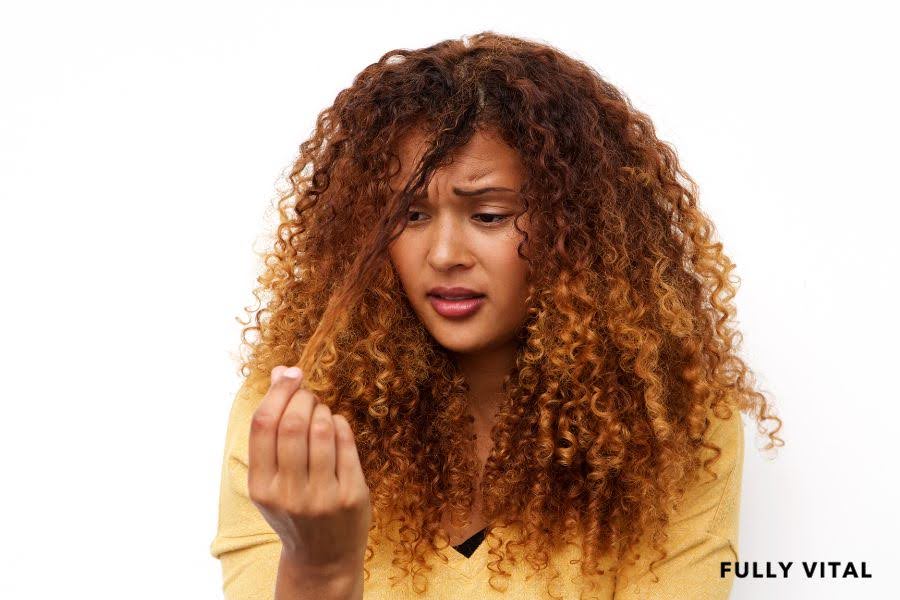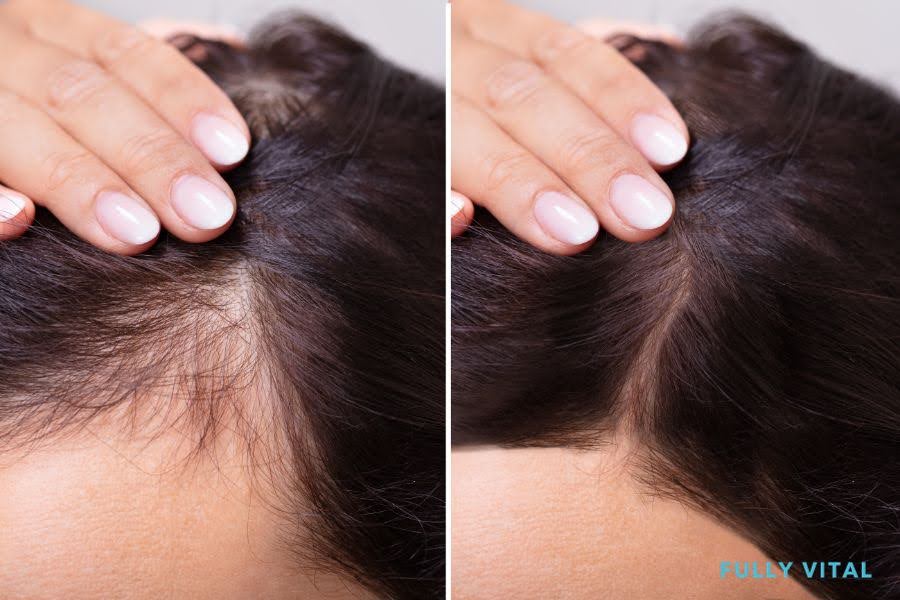
Signs and Symptoms of Protein Overload in Your Hair
When it comes to maintaining the quintessential crowning glory - our hair - protein often takes the spotlight in plenty of hair care discussions.
It's no secret that protein is a critical building block of healthy hair, but can too much of a good thing spell disaster for your tresses?
Absolutely.
Protein overload, a less discussed but equally significant concern, can lead to an unexpected paradox where boosting hair strength turns into brittleness and damage.
As we explore the signs and symptoms of protein overload in your hair, our aim is to navigate you away from common pitfalls and towards a balanced approach to hair protein use.
Revive your locks from protein overload with Fully Vital's hair growth wonders.
Achieve the lustre you've missed and feel the difference in your hair’s health and growth.

I LOVE MY HAIR NOW
FullyVital hair serum and hair vitamins made tremendous improvements in my hair. I truly love my hair now.
Shop Hair ProductsWhat Is Protein Overload?
The Role Of Protein In Hair Health
Protein serves as the fundamental building block for hair, constituting mainly keratin, which provides strength and structure.
Like a steady scaffold, protein supports hair's resilience against the daily wear and tear.
However, an imbalance, specifically an excess, can disrupt this structural integrity.
Causes Of Protein Overload
Protein overload occurs when the hair receives more protein than it can handle, often stemming from overuse of protein-rich products or treatments.
Factors contributing to this imbalance range from individual hair type susceptibilities to lack of awareness about product ingredients and their effects on hair.
Recognizing Protein Overload
Physical Signs In Your Hair Strands
Hair that suffers from protein overload often feels stiff and straw-like to the touch.
You might notice that your hair is difficult to style, and it seems excessively dry or brittle.
As you brush or run your fingers through your hair, you may find that it snaps easily, evidencing a lack of elasticity which is a classic sign of too much protein binding the hair strands.
Changes In Hair Texture And Appearance
Aside from the tangible texture changes, the appearance of your hair might also shift.
A lustrous mane might start to appear dull and lack the usual sheen.
Curls and waves may lose their bounce and definition, leaning towards a lifeless form instead.
You may also find that your hair becomes uncharacteristically tangled or knotted, resisting your usual grooming methods.
The Impact Of Too Much Protein
Short-Term Effects On Hair
In the short-term, an overdose of protein can lead to apparent changes in hair behavior such as increased porosity, which affects how hair absorbs and retains moisture.
You might notice that your hair becomes unusually frizzy or static.
The once manageable hair may now feel like a challenge, struggling with common styles and resisting products that once delivered desirable results.
Long-Term Consequences
Over a prolonged period, the consequences of protein overload can escalate from mere frustration to significant hair damage.
Continued lack of moisture due to an imbalanced protein level can lead to hair that is not only dry and brittle, but also prone to breakage.
Long-term protein overload without proper intervention may cause thinning of hair and exacerbate issues like split ends.
The overall health of your hair could spiral downward if the protein mismanagement is not addressed in time.
Common Misconceptions About Protein Treatments
Myth Vs. Reality
There's a widespread notion that protein treatments are a cure-all for hair issues, but this isn't entirely accurate.
Protein is essential, but too much can be detrimental, and not every hair type requires frequent protein treatments.
The myth of 'more is better' often leads to protein overload, while the reality is that balance is key to hair health.
Understanding Protein Balance
Protein balance hinges on aligning protein treatments with the natural protein composition of your hair and its unique needs.
Not all protein sources are equal, nor do they affect hair in the same manner.
Moreover, what works for one person may not work for another.
Understanding the proper balance involves knowing when to incorporate protein into your routine, recognizing which products provide the right type of protein for your hair, and identifying when it's time to switch from protein treatments to moisturizing regimens.
Managing Protein Overload
Immediate Steps To Take
If you suspect your hair is experiencing protein overload, it’s crucial to switch gears promptly.
Begin by putting aside any hair products that contain protein—this includes shampoos, conditioners, masks, and leave-in treatments.
Next, focus on reintroducing moisture to your hair.
Hydrating treatments, such as deep conditioning masks that emphasize moisture over protein, can start to reverse the brittleness and restore flexibility to the hair fibers.
Adjusting Your Hair Care Routine
Adopting a balanced hair care routine is central to recovering from protein overload.
Once you've paused the use of protein treatments, analyze your routine to ensure you have a harmonious mix of moisturizing and strengthening products, with a heavier emphasis on the former.
Ingredients like aloe vera, glycerin, and panthenol are good moisture-promoting components to look out for.
Moreover, consider the frequency of washing your hair, as over-washing can lead to the stripping of natural oils that help maintain moisture balance.
Preventing Protein Overload
How To Recognize The Right Protein Balance
Recognizing the right protein balance requires a keen understanding of your hair's specific needs.
It involves observing how your hair reacts to different types of treatments.
A good rule of thumb is treating with protein sparingly and only when your hair shows signs of needing it, like after excessive styling, heat damage, or coloring.
Also, getting to know the signs of healthy hair—elastic, strong, and moisturized—helps in avoiding the imbalance that leads to overload.
Tips For Maintaining Healthy Hair
Key to preventing protein overload is creating and maintaining a hair care routine that fosters balance.
Be selective with the products you use, and always read ingredient lists to avoid hidden proteins.
Implement routine hair assessments to check its health and respond appropriately.
Balance out protein use with regular moisturizing treatments, and don't forget to protect your hair from environmental stressors like UV rays and pollution.
Finally, consider getting regular trims to remove any damaged ends, which can exacerbate protein imbalance issues.

When To See A Professional
Signs That You Need Expert Advice
While many aspects of hair care can be managed at home, certain conditions require professional insight.
If your hair continues to break even after adjusting your protein and moisture treatments, or if you're unable to determine the cause of your hair's distress, it may be time to consult a hair care professional.
Specialists can analyze your hair's condition, perform treatments that may be too complex for at-home care, and provide a personalized care regimen.
How Professionals Can Help
A professional can offer services such as protein treatments that are tailored to your hair's specific needs, moisture therapy sessions, and even scalp treatments to promote overall hair health.
They can also educate you on product knowledge and proper application techniques.
By seeking expert advice, you ensure a comprehensive approach to solving protein overload and achieving the optimal health for your hair.

Discover the Power of Fully Vital Hair Growth ProductsAt Fully Vital, we understand the frustration and concern that comes with the aging of your hair. That's why we have developed a range of hair growth products that are designed to stop and reverse the aging process, giving you healthier, more resilient locks. Here are some key features and benefits of our products:
With Fully Vital, you can take control of your aging hair and achieve the beautiful, vibrant locks you deserve. Experience the power of our hair growth products and unlock your hair's true potential. |
Final Thoughts On Protein Overload In Hair
The balance between protein and moisture is crucial for maintaining the health and integrity of your hair.
Protein overload can sneak up on you, quietly compromising the luster and strength of your strands.
It can lead to a range of issues, from an unflattering matte finish to the heart-sinking snap of hair breakage.
However, this condition is far from irreversible.
By recognizing the symptoms early and adjusting your hair care routine, you can restore your locks to their natural state of vitality.
Remember that moderation is key to avoiding such pitfalls.
It's about finding equilibrium within your hair care regimen and responding to the unique needs of your hair.
Should you find yourself struggling with protein overload, don't hesitate to seek professional advice.
Hair health is a journey, not just a destination, and informed decisions along the way can make all the difference in achieving that vibrant, healthy mane we all strive for.
Need a hair hero?
Fully Vital's hair growth products are your allies against protein overload.
Start rejuvenating your strands and watch your hair grow with strength.
Check out our recent blogs:
- Achieve Gorgeous Locks: Your Path With A Reputable Hair Doctor
- Stunning Half And Half Hair Ideas: Transform Your Look Today!
- Hair Sos: How To Eliminate Stubborn Cowlicks For Good
Frequently Asked Questions About Protein Overload In Hair
What are the first signs of protein overload in hair?
First signs include hair feeling stiff, straw-like, excessively dry, tangled, and brittle.1
Can protein overload cause hair loss?
Yes, long-term protein overload without intervention may lead to hair thinning and breakage.2
How can I fix protein overload?
Temporarily stop using protein treatments, switch to moisturizing products, and assess your hair care routine to find a balance.3
How often should I use protein treatments on my hair?
Use protein treatments sparingly, only when necessary, such as after damage due to styling, heat, or coloring.4
Can I still use protein treatments if I have protein overload?
It's best to avoid protein treatments until your hair's moisture balance is restored.5
What ingredients should I avoid if my hair has protein overload?
Avoid ingredients like keratin, amino acids, protein extracts, and silk protein until your hair recovers.6
Are there specific hair types more prone to protein overload?
Yes, low porosity hair types tend to be more prone to protein overload due to the difficulty in absorbing moisture.7
What does protein-overloaded hair look like?
Hair looks dull, lifeless, lacks shine, and may appear frizzy or static.8
Why does my hair need protein at all?
Protein strengthens hair, providing structure and resilience against damage.9
Should I see a professional for protein overload, and what can they do?
If conditions persist, a professional can analyze your hair health, provide tailored treatments and educate you on proper hair care.10
Sources:
- Healthline. (2022). Can you have too much protein in your hair? Retrieved from https://www.healthline.com/health/beauty-skin-care/too-much-protein-in-hair
- Nature. (2018). Proteomic analysis of human hair samples and insights into hair function. Nature Scientific Reports. Retrieved from https://www.nature.com/articles/s41598-018-20041-9
- Curl Centric. (2023). Protein Overload: What Is It? How to Fix and Prevent It. Retrieved from https://www.curlcentric.com/protein-overload/
- Salon Worthy Hair. (2021). How to Fix Protein Overload in Hair – 11 Easy Solutions. Retrieved from https://salonworthyhair.com/fix-protein-overload-hair
- Grow Gorgeous. (2021). What is Protein Overload in Hair and How to Fix it. Retrieved from https://www.growgorgeous.com/blog/tips-tutorials/what-is-protein-overload-in-hair-and-how-to-fix-it/
- Curlsmith. (2021). Protein Overload: Signs & How to Fix It. Retrieved from https://curlsmith.com/blogs/curl-academy/protein-overload
- mindbodygreen. (2021). Protein Overload: How to Tell & The Best Products to Fix It. Retrieved from https://www.mindbodygreen.com/articles/protein-overload
- ScienceDaily. (2022). Scientists find surprising link between the immune system and hair growth. Retrieved from https://www.sciencedaily.com/releases/2022/06/220623110948.htm
- News Medical. (2024). The Science Behind Healthy Hair. Retrieved from https://www.news-medical.net/health/The-Science-Behind-Healthy-Hair.aspx
- Wired. (2024). A Hair Loss Study Raises New Questions About Aging Cells. Retrieved from https://www.wired.com/story/a-hair-loss-study-raises-new-questions-about-aging-cells/








